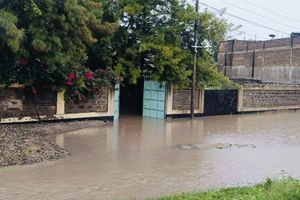UK agencies to aid 10m hit by drought

Photo/FILE
As drought continues to bite in Northern Kenya, the most affected are children and the elderly.
Fourteen UK aid agencies have launched a joint appeal to help more than 10 million people across Kenya, Somalia, Ethiopia and South Sudan deal with their worst drought in over half a century.
The Disasters Emergency Committee (DEC) chief executive Brendan Gormley said the aid agencies, which include Oxfam, Christian Aid, the Red Cross and Cafod, “have a duty to help quickly before the situation spirals out of control”.
Large areas of Kenya, Somalia, Ethiopia and South Sudan are affected by the drought which follows successive failures in the rainy season.
The issue has been exacerbated by the high price of food and the crisis in Somalia which has led to tens of thousands of people fleeing the country into Kenya over the past weeks.
In London last week, Prime Minister Raila Odinga asked Britain to consider increasing assistance to Kenya, particularly for the school feeding programme, and targeted food subsidy to deal with the effects of the drought and looming food crisis.
Mr Odinga also called on the international community to work more closely with Kenya to find a more permanent and sustainable solution to the problem of refugees flocking into camps in the country, adding that food insecurity in Kenya undermined the country’s capacity to shoulder the refugee burden for the region.
Made appeal
He made the appeal at discussions with UK Foreign Office minister for Africa Henry Bellingham and International Development minister Stephen O’Brien at Lancaster House in London.
More than 1,300 people, the majority of them children, are each day arriving in the Dadaab refugee camp in eastern Kenya near the border with Somalia.
The Dadaab camp is already the world’s largest refugee camp with a population of 350,000 – but the number is now projected to rise to nearly half a million people by the end of the year.
“Of course these people need a long-term solution with investment and political will – but right now it’s about preventing a tragedy,” said Mr Gormley.
“Many of these are a forgotten people, caught in the midst of conflict in Somalia and an ever-worsening environmental crisis.”
Agencies will be working through local partners to access remote and difficult-to-reach areas across East Africa with food, water, therapeutic feeding for malnourished children and medical treatment.
Despite the enormous challenges of reaching those affected in Somalia in particular, DEC agencies and their partners are already helping hundreds of thousands of people – but their work is being severely hampered by lack of funding.
The UK has taken a lead among the world’s governments with a pledge of £38m to the World Food Programme of the UN, which will provide the food aid that many of the DEC’s members will be distributing. The UN’s own appeal is only 40 per cent funded.




